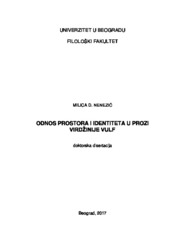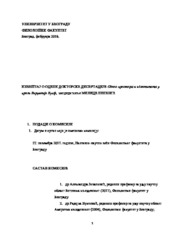Приказ основних података о дисертацији
Odnos prostora i identiteta u prozi Virdžinije Vulf
The relationship between space and identity in Virginia Woolf's fiction ; Oтношение пространства и идентичности в прозе Вирджинии Вульф
| dc.contributor.advisor | Paunović, Zoran | |
| dc.creator | Nenezić, Milica D. | |
| dc.date.accessioned | 2018-07-03T15:29:51Z | |
| dc.date.available | 2018-07-03T15:29:51Z | |
| dc.date.available | 2020-07-03T10:11:28Z | |
| dc.date.issued | 2018-05-14 | |
| dc.identifier.uri | http://eteze.bg.ac.rs/application/showtheses?thesesId=5863 | |
| dc.identifier.uri | https://nardus.mpn.gov.rs/handle/123456789/9567 | |
| dc.identifier.uri | https://fedorabg.bg.ac.rs/fedora/get/o:17774/bdef:Content/download | |
| dc.identifier.uri | http://vbs.rs/scripts/cobiss?command=DISPLAY&base=70036&RID=50189327 | |
| dc.description.abstract | Život i rad Adeline Virdžinije Stiven, kasnije Vulf, ne vezuje se samo za kraj 19 i 20-ti vijek već za svevremeni literarni opus jedne spisateljice. Njena djela, koja pokrivaju širok spektar književnog izraza, obilježila su i bilježe do danas anatomiju ljudskog identiteta u prostoru i prostorima koje određuje život. Od nastanka njenog prvog romana do posthumno izdatih eseja i dnevnika ovaj ženski um preispitao je skoro sve moguće sfere ljudskog postojanja, uz interakciju identiteta i prostora kao osnovnih postulata jedne umjetničke vizije. Istražiti vezu između umjetnosti i života bila je njena misija po kojoj je, sa sumnjom u bilo kakav uspjeh u nastojanjima da prevaziđe konvencionalnu strogost patrijarhalnog društva, autentično ženski re-kreirala stvarnost jedinstvenim okom pisca. Nimalo oduševljena realizmom kao neproduktivno-obezličenim književnim pravcem, smjelo se okrenula modernom književnom izrazu, kojim eksperimentiše u preispitivanju, istraživanju, ‘mjerenju i rastakanju’ smisla ljudskog postojanja kroz svijest svojih protagonista. Sazrijevanjem kroz umjetnički izraz, otkrivala je nove izazove i postavljala pitanja na koja se odgovori, bez kritičarski usmjerene note, naslućuju i pronalaze individualno. Rad ima za cilj predstaviti određena djela Virdžinije Vulf kao literarno ostvarivu koncepciju prostorno-identitetske refleksije ženskog pisca s početka 20. vijeka, u kom je literatura u Engleskoj previrala iz konvencionalnog i tradicionalnog u realnost novog i drugačijeg, i u kom se ova čvrsta ženska misao potvrđivala i kritički i kreativno produktivnom. Za Virdžiniju Vulf i književnost, put ka nevidljivom tronu objedinio je vezu između života i umjetnosti u artefakt koji je do danas ostao predmet književnih kritika, teorija i analiza. U radu će se pokušati dodati još jedna perspektiva kroz odnos prostora i identiteta koje pisac postavlja kao moguće polazište odnosa života i umjetnosti. Sa stanovišta filozofske, književno-teorijske, istorijske, društvene i biografske perspektive, te feminističke književne teorije i kritike, psihoanalize i savremene književne kritike, u romanima Gospođa Dalovej, Ka svetioniku, Orlando i diskursu Sopstvena soba rad će istraživati vezu između prostora i identiteta što stvarne, što simbolične predstave bića, njegovog postajanja i postojanja, kako u umjetničkom, tako i u prostoru kritičke recepcije. Pored toga, rad će nastojati iz još jednog ugla zaokružiti priču o ‘neuhvatljivom identitetu’ Virdžinije Vulf u prostoru stvarnog i po prostorima njene fikcije. | sr |
| dc.description.abstract | The life and work of Adeline Virginia Stephen, later Woolf, is not linked only to the end of 19th and the 20th centuries, but to an ever-present contemporariness of the literary oeuvre of one female author. Her works, which cover a wide spectrum of literary expression, have marked up to the present time an anatomy of the human identity within the space and spaces designed by life itself. From the time of her first novel to the posthumously published essays and diaries, this female mind had reviewed almost all the possible spheres of human existence along with the inherent interaction of space and identity as the basic postulates of one artistic vision. The relation between life and art was her mission, in which, until her end, suspicious of any success in overcoming the conventional strictness of the patriarchal society, she built connections with reality seen by the eye of a unique author. Not at all impressed by Realism as an unproductively impersonalised literary epoch, she boldly escaped into Modernist literary expression, with which she experimented in re-examining, researching, ‘measuring and dissolving’ the essence of human existence through the consciousness of her protagonists. Thus maturing through artistic expression, she constantly opened new chapters and challenges, implying questions free of any critically aimed tone, and leaving them all open to individual interpretation. This paper is an attempt to present some of Virginia Woolf's works of fiction as a literarily achievable concept of the reflection on space and identity of a female author at the beginning of the 20th century, a time when literature in England seethed from the conventional and traditional into the challenging reality of the modern, proving that her mind was both critically and creatively productive. Still, for both Virginia Woolf and literature, the path towards the invisible throne united the relationship between life and art with an artifact which has remained so far the subject of literary criticism, theories and analyses. This work will attempt to add one more perspective through the relationship between space and identity, which the author sets forth as a possible opening perspective and basis in the relationship between life and art. Based on philosophical, literary and theoretical, historical, social and biographical perspectives, together with feminist literary theory, then psychoanalysis and contemporary literary criticism, this paper will try to find connections between space and identity in both the realistic and symbolic meaning of becoming and being, in both artistic and critical reception. It will focus on the novels Mrs Dalloway, To the Lighthouse and Orlando, and the critical discourse A Room of One's Own. Additionally, the paper aims to introduce one more perspective in rounding off the story about Virginia Woolf’s ‘elusive identity’ in the space of reality and through the spaces of her fiction. | en |
| dc.format | application/pdf | |
| dc.language | sr | |
| dc.publisher | Универзитет у Београду, Филолошки факултет | sr |
| dc.rights | openAccess | en |
| dc.rights.uri | https://creativecommons.org/licenses/by-nc-nd/4.0/ | |
| dc.source | Универзитет у Београду | sr |
| dc.subject | Virdžinija Vulf | sr |
| dc.subject | Virginia Woolf | en |
| dc.subject | space | en |
| dc.subject | identity | en |
| dc.subject | fiction | en |
| dc.subject | woman writer | en |
| dc.subject | philosophy | en |
| dc.subject | modernism | en |
| dc.subject | literary criticism | en |
| dc.subject | prostor | sr |
| dc.subject | identitet | sr |
| dc.subject | proza | sr |
| dc.subject | žena-pisac | sr |
| dc.subject | filozofija | sr |
| dc.subject | modernizam | sr |
| dc.subject | književna kritika | sr |
| dc.title | Odnos prostora i identiteta u prozi Virdžinije Vulf | sr |
| dc.title.alternative | The relationship between space and identity in Virginia Woolf's fiction ; Oтношение пространства и идентичности в прозе Вирджинии Вульф | en |
| dc.type | doctoralThesis | en |
| dc.rights.license | BY-NC-ND | |
| dcterms.abstract | Пауновић, Зоран; Ненезић, Милица Д.; Однос простора и идентитета у прози Вирджиније Вулф; Однос простора и идентитета у прози Вирджиније Вулф; | |
| dc.identifier.fulltext | https://nardus.mpn.gov.rs/bitstream/id/29121/Disertacija.pdf | |
| dc.identifier.fulltext | https://nardus.mpn.gov.rs/bitstream/id/29122/IzvestajKomisije17055.pdf | |
| dc.identifier.fulltext | http://nardus.mpn.gov.rs/bitstream/id/29121/Disertacija.pdf | |
| dc.identifier.fulltext | http://nardus.mpn.gov.rs/bitstream/id/29122/IzvestajKomisije17055.pdf | |
| dc.identifier.rcub | https://hdl.handle.net/21.15107/rcub_nardus_9567 |



